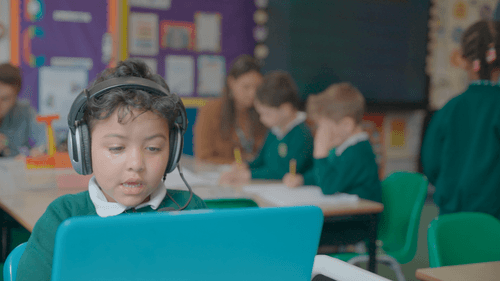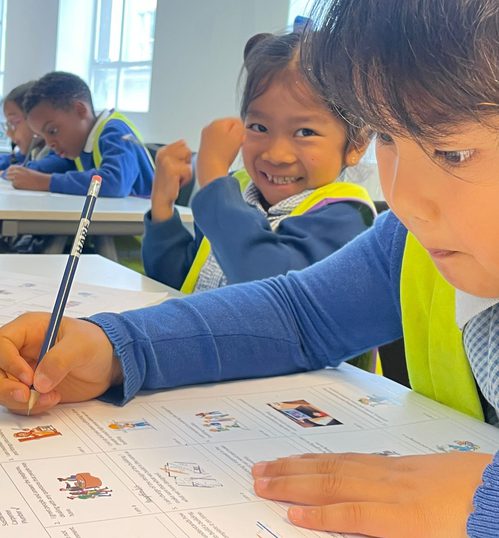Why we chose to partner with Chapter One
Cath Howard, Environmental Sustainability Manager, Balfour Beatty Kilpatrick
Share this page

Cath Howard is the Environmental Sustainability Manager at Balfour Beatty Kilpatrick, based in West Cumbria. The main focus of her role is Social Impact and she spent many years in the not-for-profit sector including in philanthropy/grant-making as well as in local government, before moving to the private sector three years ago. She is herself a Chapter One online reading volunteer as well as the volunteer co-ordinator for Chapter One in the Balfour Beatty Kilpatrick (BBK) team.
Why did Balfour Beatty Kilpatrick sign up as Chapter One partners?
In West Cumbria, the Programme and Project Partners (PPP) at Sellafield Ltd brought in Chapter One as a way for its supply chain to meet some of their Social Impact Commitments. BBK was asked to take part and after learning more about it, we jumped at the chance to be involved. We signed up for Chapter One because we wanted to do something that any member of staff could do, from any office or location, and one which made a measurable impact. Our staff work and live in different locations, but this didn’t matter as any staff from across the Business Unit could get involved – all they needed was a laptop and a phone.
How was the first year?
The first year went fairly smoothly overall. Once our volunteers' DBS checks were processed and they had watched the compulsory two 30-minute training videos, they were matched with a child in one of our local primary schools. As many staff were still nervous about their first session, even after the training, Chapter One ran extra sessions for volunteers on how to engage with their child as well as some top tips about getting started. We also learnt from each other – one of the volunteers told me she used the whiteboard function on the Chapter One platform for the child to create stories with, which made a nice change from the stories and games occasionally. Obviously, people change jobs and companies, but all bar one volunteer stayed for the full period of time we committed to. Some are happy to continue with reading as it restarts next year.
Staff involved can gain confidence in themselves as they see the success they have, as well as feeling good about doing something that helps children achieve and develop.
Cath Howard, Balfour Beatty Kilpatrick
How do you measure the programme's Social Return On Investment (SROI)?
BBK records the number of staff hours spent on local school and college visits supporting pupils, for example, delivering career talks, curriculum support, literacy support, and safety talks (including preparation time).
For Chapter One, we multiply staff hours by £16.93/hour, so if 10 staff spend 0.5hrs per week over the school year, that’s 125 hours @ £16.93 = £2116.25.
However, this figure doesn’t measure the true value of the impact as it merely measures the staff time involved. Research has shown that children who are behind with their reading in primary school, often struggle to keep up and easily fall behind their peers. This continues into secondary school and can lead to significant differences of incomes across their lifetime. The National Literacy Trust stated in their report, Language Unlocks Reading, “By the age of five, children from the most disadvantaged backgrounds are starting school 19 months behind their better-off peers, and struggle to catch up from then on. Last year alone, 180,000 five-year-olds in England started school without the communication, language and literacy skills expected for their age. This is a gap that if left unaddressed will hold them back at every stage of their lives. Only 11% of those children who have not reached the expected standard in English at the end of primary school will go on to achieve a good pass grade (Level 4 equivalent or above) in English and maths GCSEs. What’s more, children with poor vocabulary age five are more than twice as likely to be unemployed at age 34.”
Another hard to measure outcome is the employee’s own personal development. Staff involved can gain confidence in themselves as they see the success they have, as well as feeling good about doing something that helps children achieve and develop. This can foster feelings of more engagement with the company overall. Some staff felt it helped then understand the importance of reading to their own children too.
BBK encourages all staff to use up to two days per annum on volunteering. However, in rural communities, it can mean we spend two hours travelling to give two hours to a school/community group. As the Chapter One programme requires no travel, it is a super-efficient way of using your volunteer hours in order to see an impact.
How has Chapter One helped strengthen your networks and community?
We used the cohort of 10 volunteers to include some of our supply chain and partner companies wanting to “trial it” which worked really well. Two companies are now putting their own cohort together for the 2023-24 school year.
I created a little e-mail group (you also can do WhatsApp) so that we were all “Chapter One Volunteers”, no matter where we worked, and this gave us a sense of camaraderie - working together across different disciplines and organisations. It meant I got to know staff that are not based in our local office as well as staff from other companies too, strengthening partnerships for the future.
Tell us a little more about your personal experience of reading with a Chapter One child?
I think I enjoyed giving “high fives” as much as Evie enjoyed getting them!
I was a little sceptical at first as to whether 30 minutes a week could make a difference in reading levels especially as it is done virtually, however to my surprise, my child has gone up a reading level – you can choose a reading level higher up if your child is finding it easy to read their stated level books.
I’ve looked forward to the reading session and as one volunteer said at a Chapter One celebration, “It doesn’t matter how bad a day or week you have had, you cannot fail to be cheered up by reading to a 6-year-old.”
Ms Dover, the class teacher at Ellenborough Primary, one of our Cumbria partner schools, said: “The children are really enjoying taking part in the programme. They ask me who is reading every morning, and then get really excited when the laptop calls and they call for the child whose turn it is. Some of the children who can be shy are confident in reading and talking to their reading partner, and I think this is the way that the programme is delivered, and they don't feel as much pressure as they may if reading face-to-face.”
Below: Cath with her fellow Chapter One volunteers from Balfour Beatty Kilpatrick and Mitie at Ellenborough Primary School, Cumbria, and Chapter One end-of-year reading celebrations at Flimby Primary School with Mark Cant (left) from the Programme and Project Partners (PPP) at Sellafield Ltd.


Webinar: Exploring the True Measure of Social Impact
Cath Howard participated in an online panel discussion about how we can measure the true value of the impact of programmes like Chapter One. Fellow panelists were from GRAHAM, National Highways and Sir Robert McAlpine. You can watch the webinar back by clicking on the button below (free but registration required).
HOW CAN COMPANIES GET INVOLVED IN CHAPTER ONE?
Chapter One’s virtual, time-efficient, flexible model for volunteering will enhance your company’s employee value proposition, whilst fulfilling CSR or social value commitments around education, social mobility and inclusion. Employees can:
- volunteer online directly from their desks with no travel
- make a direct impact on the lives of disadvantaged children
- support local communities across the UK
- improve their own well-being by helping others
- reconnect with your company’s social purpose
If you’re interested in joining us, we’d love to hear from you! You’ll find out who we currently work with on our partners’ page.. You can contact us here or email sarah.taylor@chapterone.org




